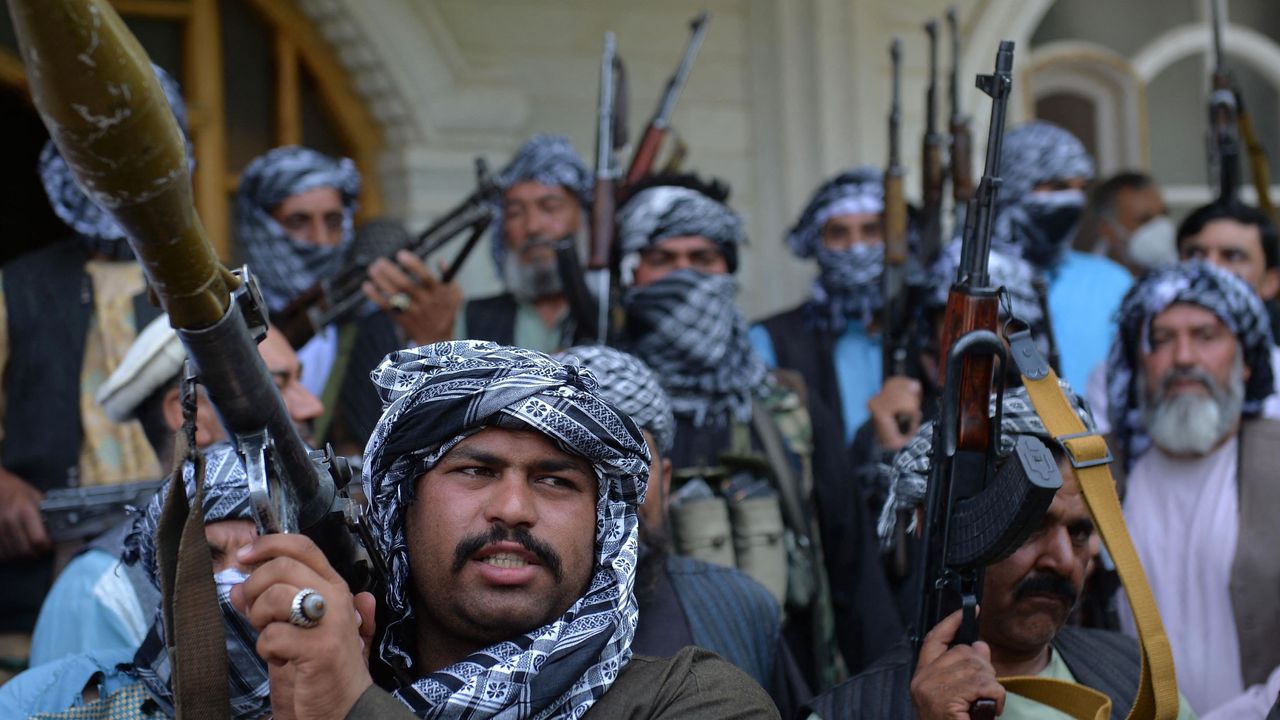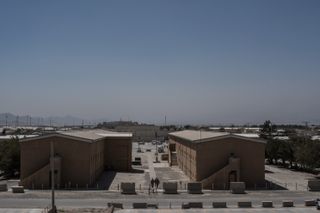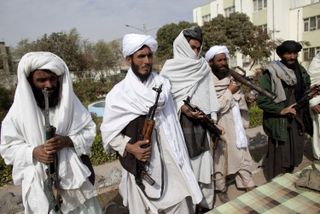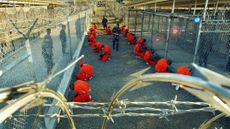Taliban seizes cities as Afghan military collapses
More than 1,000 soldiers flee across border as others hand over weapons to insurgents

The commander of the US mission in Afghanistan has warned that the withdrawal of international troops over the coming weeks threatens to plunge the country back into civil conflict.
The New York Times (NYT) reports that during “a rare news conference” at the headquarters of the US and Nato command in Kabul, General Austin S. Miller told reporters that “civil war is certainly a path that can be visualised if it continues on the trajectory it’s on”.
Miller added that the looming threat of mass bloodshed should be a “concern for the world” - a message underlined by a recent “Taliban offensive that has seized around 100 district centres, left dozens of civilians wounded and killed, and displaced thousands more”, says the newspaper.
Subscribe to The Week
Escape your echo chamber. Get the facts behind the news, plus analysis from multiple perspectives.

Sign up for The Week's Free Newsletters
From our morning news briefing to a weekly Good News Newsletter, get the best of The Week delivered directly to your inbox.
From our morning news briefing to a weekly Good News Newsletter, get the best of The Week delivered directly to your inbox.
Fragile state
Despite a series of warnings from US security agencies and foreign allies about the risks of ending the 20-year occupation, Joe Biden has set 11 September as the deadline for his country’s forces to quit Afghanistan.
But US officials told Reuters on Tuesday that the military was on track to complete its withdrawal within days, as “the Taliban insurgency ramps up its offensive throughout the country”.
The US “stopped publicly detailing the pace of its withdrawal” after passing the 50% point last month, says the news agency. Once completed, the only military presence remaining in Afghanistan will reportedly be “around 650 troops” left “to protect diplomats at the US embassy and potentially assist in securing Kabul airport”.
Sign up for Today's Best Articles in your inbox
A free daily email with the biggest news stories of the day – and the best features from TheWeek.com
General Miller told this week’s press conference that from a “military standpoint”, the departure is “going very well”.
However, intelligence estimates are that “the Afghan government could fall in six months to two years after a final American withdrawal”, says the NYT.
In recent days, “Taliban fighters have overrun parts of three provinces, all just short drives from Kabul on highways running north and south”, The Washington Post reports. The insurgents have also “attacked security posts in a third area that hugs the city’s western border”, adds the paper.
Citing the accelerating loss of territory amid a “countrywide offensive” by the Taliban, Miller warned that “the security situation is not good”, adding: “There are a lot of questions about why and how this is happening.”
A UN report published at the start of June said that up to 500 al-Qaeda fighters were also believed to be in Afghanistan and that the Taliban maintained a close relationship with the fellow Islamist extremist group.
These ties have prompted fears that an emboldened Taliban could provide “al-Qaeda space in which to rebuild and plan new attacks on US and other targets”, says Reuters.
Blunted defences
As the withdrawal speeds ahead, images are emerging showing “Bagram airfield, once the heart of American military power in Afghanistan, being packed up by US forces”, The Times reports. “Often compared to a small city”, the base “will be taken over by the Afghan military to help them combat the chaos that is expected to follow”, says the paper.
The departure of Nato troops is also gathering pace, with the German Defence Ministry this week announcing the completion of its withdrawal of 1,100 troops that had been operating within the military alliance’s 9,600-strong training and support mission.

For months, Pentagon chiefs have “argued for some sort of lasting American military presence in Afghanistan”, warning Biden of “counterterrorism concerns and the need to provide a check on the Taliban’s advance”, the NYT says. But the president has remained steadfast in his belief that the US’s longest war must come to a complete end.
*Although the US military is “still providing what support it can to the Afghan security forces”, the paper continues, most “high-tech American communications equipment” has been removed, hindering efforts to continue responding to threats.
An unnamed official told the NYT that in at least one instance, bomber jets were unable to communicate to carry out an air strike on Taliban positions, forcing command to attack with an armed drone instead.
Experts estimate that the Taliban already controls “as many as 140 of the country’s 370 districts and are active or influential in 170 others”, The Washington Post reports. And although peace talks are ongoing between the insurgents and the government, “more districts continue to fall to the Taliban almost daily”, in “violent clashes” or “peaceful surrenders”.
Rahmatullah Nabil, a former national intelligence director, told the paper that the Taliban’s tactic is to “surround” Kabul and other provincial capitals, “pushing closer and closer from all sides until they can stop, just short of entering Kabul, and say they are now ready to talk about peace”.
Taliban insurgents have also begun seizing other strategic targets including areas along the border with Pakistan and key mineral mines and dams - prompting Pakistani Prime Minister Imran Khan to add his voice to the growing chorus of warnings about a potential full-blown civil conflict.
Khan told US news platform Axios that “there must be a settlement” before US troops leave his country’s northwestern neighbour, to prevent the Taliban going “for an all-out victory” that would cause “an incredible amount of bloodshed”.
Pakistan would also “suffer” as a result of this “civil war”, Khan said, adding: “A political settlement in Afghanistan would mean a sort of coalition government. A government from the Taliban side and the other side. There is no other solution.”
History repeated
With the insurgents continuing to seize key targets, the “domino effect of falling districts has only served to demoralise the Afghan security forces”, the NYT says.
Many have seen “comrades surrender, forfeiting their vehicles and equipment to an increasingly triumphant Taliban”, evoking memories of “the civil war in the 1990s” that saw “warlords and their fiefs of armed men” harass Afghans “to the point where the Taliban’s rise was welcome”.

Pakistani journalist Zahid Hussain predicts a repeat of those dark days, “when several mujahideen groups fought each other, plunging Afghanistan into a devastating civil war and killing thousands of Afghans”.
In an article in Pakistani newspaper Dawn, he recalls how “those events saw the rise of the Taliban movement” - and warns that the “withdrawal of the foreign forces and the looming threat of a Taliban takeover” has “compelled” militias to raise their own forces again.
Although Biden has assured Afghan’s President Ashraf Ghani of “continued US financial, political and moral support, that may not be able to save Afghanistan from the looming civil war”, Hussain writes. And “it could be an unending war with no winner”.
At a White House press conference following talks with Ghani in Washington D.C. last week, Biden told a press conference that the “Afghans are going to have to decide their future, what they want”, adding: “The senseless violence has to stop.”
But “the violence is unlikely to come to a halt any time soon”, says the NYT, with peace talks in Doha stalled and “the insurgents’ gains on the battlefield” suggesting that “the Taliban is increasingly likely to only settle for an outright military victory”.
As commander of the US mission on the ground, General Miller knows the situation better than most. And his assessment is “bluntly pessimistic”, adds The Washington Post.
The war may be ending for the US, the paper continues, but Miller and other military chiefs fear that Afghanistan will “spiral into a state of violence”, triggering “a multifactional civil war” and a return to “old ethnic vendettas and abusive battlefield behaviour”.
Joe Evans is the world news editor at TheWeek.co.uk. He joined the team in 2019 and held roles including deputy news editor and acting news editor before moving into his current position in early 2021. He is a regular panellist on The Week Unwrapped podcast, discussing politics and foreign affairs.
Before joining The Week, he worked as a freelance journalist covering the UK and Ireland for German newspapers and magazines. A series of features on Brexit and the Irish border got him nominated for the Hostwriter Prize in 2019. Prior to settling down in London, he lived and worked in Cambodia, where he ran communications for a non-governmental organisation and worked as a journalist covering Southeast Asia. He has a master’s degree in journalism from City, University of London, and before that studied English Literature at the University of Manchester.
-
 Why some people remember dreams and others don't
Why some people remember dreams and others don'tUnder The Radar Age, attitude and weather all play a part in dream recall
By Chas Newkey-Burden, The Week UK Published
-
 The Week contest: Hotel seal
The Week contest: Hotel sealPuzzles and Quizzes
By The Week US Published
-
 New FBI Director Kash Patel could profit heavily from foreign interests
New FBI Director Kash Patel could profit heavily from foreign interestsThe Explainer Patel holds more than $1 million in Chinese fashion company Shein
By Justin Klawans, The Week US Published
-
 Will Iran's attack on Israel backfire?
Will Iran's attack on Israel backfire?Today's Big Question The unprecedented targeting of Israel could be a 'godsend' for Netanyahu as the limits of Tehran's military power are exposed
By Elliott Goat, The Week UK Published
-
 Will Iran risk all-out war with Israel?
Will Iran risk all-out war with Israel?Today's Big Question Tehran has not wanted to be directly involved in the Middle East conflict so far. But that could be about to change
By Chas Newkey-Burden, The Week UK Published
-
 A history of Guantánamo Bay
A history of Guantánamo BayThe Explainer War of Terror's 'symbol of torture, rendition and indefinite detention' is subject of new Serial podcast series
By The Week UK Published
-
 'Humanitarian islands': how will Israel's plan for Rafah civilians work?
'Humanitarian islands': how will Israel's plan for Rafah civilians work?Today's Big Question Designated zones in central Gaza to provide temporary housing, food and water for more than a million displaced Palestinians
By The Week UK Published
-
 How likely is an accidental nuclear incident?
How likely is an accidental nuclear incident?The Explainer Artificial intelligence, secret enemy tests or false alarms could trigger inadvertent launch or detonation
By Chas Newkey-Burden, The Week UK Published
-
 Pentagon struggles to explain Defense Secretary Lloyd Austin's secret hospitalization
Pentagon struggles to explain Defense Secretary Lloyd Austin's secret hospitalizationSpeed Read The intensely private Pentagon chief kept even President Joe Biden in the dark about his illness for 3 days
By Peter Weber, The Week US Published
-
 Israel-Hamas: what do both sides need in order to agree a sustainable ceasefire?
Israel-Hamas: what do both sides need in order to agree a sustainable ceasefire?Today's Big Question Israel and Hamas 'open' to renewed ceasefire and hostage release, as pressure mounts on Benjamin Netanyahu at home and abroad
By Elliott Goat, The Week UK Published
-
 Cluster bomb controversy hangs over Biden’s ‘chilly’ visit to UK
Cluster bomb controversy hangs over Biden’s ‘chilly’ visit to UKTalking Point US cites military ‘expediency’ but allies warn bombs could lose Ukraine the ‘moral high ground’
By The Week Staff Published